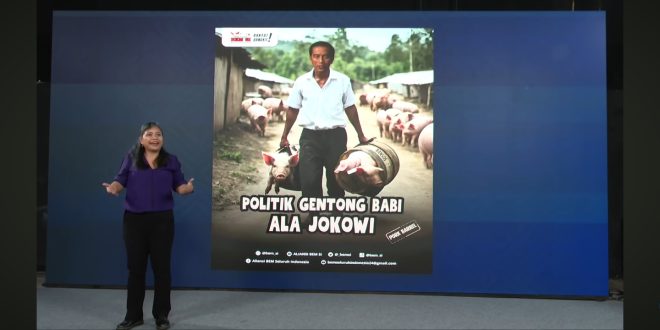The Civil Society Coalition condemns the reporting against the director and three legal experts of the documentary film “Dirty Vote.” The coalition views the criminalization of the Dirty Vote film team as a form of silencing criticism and facts. Such actions hinder the public’s right to access information and public participation in exercising social control over the conduct of the 2024 Elections.
“That is an attempt to silence those who seek to expose alleged election fraud,” the coalition wrote in a press release (13/2), quoted on February 14, 2024.
Dirty Vote is a documentary film exposing election fraud, directed by Dandhy Laksono and featuring three constitutional law experts: Zainal Arifin Mochtar, Feri Amsari, and Bivitri Susanti. The film was launched on Sunday, February 11, 2024, and garnered public attention for daring to expose election fraud benefiting certain candidate pairs. On Monday, February 12, 2024, the director and the three legal experts involved in Dirty Vote were reported by the Central Leadership Council of the Indonesian Santri Communication Forum (Dewan Pimpinan Pusat Forum Komunikasi Santri Indonesia or DPP Foksi) to the Indonesian Police Headquarters (Mabes Polri).
DPP Foksi reported the Dirty Vote team under Article 287 paragraph 5 of the Election Law, alleging a violation of the election silence period before the 2024 Elections voting day. The complainants accused Dirty Vote of engaging in black campaign tactics against one of the presidential and vice-presidential candidate pairs.
“The attempt to portray Dirty Vote as a black campaign is a form of delegitimization of the criticisms and facts presented in the film,” wrote the coalition.
According to the coalition, the provisions of the Election Law, especially Articles 280 paragraphs 1 to 4 regarding the prohibition of election campaigns, do not at all prohibit the disclosure or publication of election violation facts as revealed in Dirty Vote. The coalition considers that the documentary was not made to benefit or harm particular election participants; instead, it is a critical study based on facts that have been previously published in various journalistic works, especially since all presidential and vice-presidential candidates who contributed to the alleged fraud in the 2024 Elections are mentioned in the film.
In addition, the coalition also regrets the response to Dirty Vote. Instead of refuting the facts of fraud revealed in the documentary with adequate data, the complainants instead accused the film of being a black campaign, ordered by certain presidential candidates, and causing a commotion during the quiet period. The coalition considers these accusations to be illogical, as the facts of election violations must be disclosed to the public through various channels so that they can be processed by the Election Supervisory Body (Bawaslu).
In response, the coalition urges election organizers and law enforcement to process the facts of the 2024 Elections fraud and reject the criminalization of critics, including legal experts and all parties involved in the making of the Dirty Vote film, whether under the Election Law or other criminal provisions. The coalition also calls on the government, state apparatus, political parties, presidential and vice-presidential candidates, and all contestants not to be allergic to public criticism, including facts of election fraud.
“Urging the Indonesian Police, the Election Supervisory Body (Bawaslu), the Attorney General’s Office (Kejaksaan RI), and other institutions not to succumb to the demands or narratives of the complainants and anti-criticism parties to prosecute the figures and creators of the Dirty Vote film. Therefore, it is only right that the reports submitted by the complainants be rejected and not pursued legally,” concluded the coalition.
The Civil Society Coalition consists of Aliansi Jurnalis Independen [the Independent Journalists Alliance], Yayasan Lembaga Bantuan Hukum Indonesia [the Indonesian Legal Aid Foundation or YLBHI], LBH Pers, LBH Jakarta, Komisi Untuk Orang Hilang dan Korban Tindak Kekerasan [the Commission for the Disappeared and Victims of Violence or KontraS], the Institute for Criminal Justice Reform (ICJR), the Southeast Asia Freedom of Expression Network (SAFENet), Amnesty International Indonesia, Greenpeace Indonesia, Lembaga Studi dan Advokasi Masyarakat [the Institute for Policy Research and Advocacy or ELSAM], Pusat Studi Hukum dan Kebijakan Indonesia [Indonesian Center for Law and Policy Studies or PSHK], Yayasan Penguatan Partisipasi, Inisiatif, dan Kemitraan Masyarakat Indonesia [the Foundation for Strengthening Participation, Initiatives, and Partnerships of the Indonesian Society or YAPPIKA]. []
Translated by Catherine Natalia
 Rumah Pemilu Indonesia Election Portal
Rumah Pemilu Indonesia Election Portal




